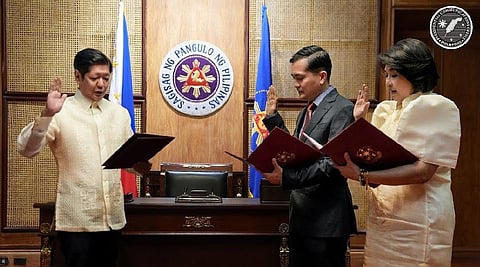
- NEWS
- the EDIT
- COMMENTARY
- BUSINESS
- LIFE
- SHOW
- ACTION
- GLOBAL GOALS
- SNAPS
- DYARYO TIRADA
- MORE

The Presidential Communications Office (PCO) under its newly appointed head, Jay Ruiz, took a swipe at former President Rodrigo Duterte over his claim the Marcos government was veering towards dictatorship.
PCO Undersecretary Claire Castro dubbed as baseless Duterte’s assertion in a campaign rally in Mandaue City on Saturday that the President would follow in the footsteps of his late father, former president Ferdinand Marcos Sr., to stay in power.
Duterte said Marcos would declare martial law in 2028 at the end of his six-year term so there would be no elections and he could hang on to his post.
“The first thing that was said was, what is the evidence? How can it be proven? Like I said, we can’t just believe in speculation without evidence,” Castro told Palace reporters.
“Maybe you remember the time of former President Duterte. He admitted that when he was a prosecutor, he was an expert in sowing intrigue and planting evidence. So, what can we expect from former President Duterte? Create intrigue, plant evidence?” she said.
She said Duterte planted evidence against former senator Leila de Lima to back his administration’s drug-related charges against her. De Lima has been acquitted of charges she used her position as justice secretary to take payoffs from drug lords held at the New Bilibid Prison.
Duterte’s weekend tirade and the Palace response were just the latest in the two camps’ war of words following the impeachment of Vice President Sara Duterte by the House of Representatives.
Castro reiterated the President’s hands-off policy in the impeachment of the Vice President, who served as his education secretary for two years. The impeachment complaints against Duterte are anchored on allegations she misused confidential funds and threatened to have the First Couple and House Speaker Martin Romualdez assassinated.
Senate President Francis “Chiz” Escudero also defended the President, describing Duterte’s accusation as “inconsistent and irrational.”
“I do not agree and do not subscribe to his accusation at all,” Escudero told reporters on Monday.
“When their accusation that PBBM (President Bongbong Marcos) was a weak leader who was not in control did not fly, they are now accusing him of the exact opposite and now he supposedly has dictatorial tendencies,” he said.
“It is not only inconsistent but also irrational and untrue,” he added.
Escudero said he has known Marcos for a long time and he “cannot infer or believe (Duterte’s accusations) from Marcos’s attitude, outlook and work ethic.”
On 21 September 1972, Marcos Sr. declared martial law and remained in power until the EDSA People Power Revolution ended his rule and drove him and his family into exile on 25 February 1986.
In previous interviews, Marcos Jr. defended the martial law imposed by his father, saying it was not to remain in power but to address the communist and separatist rebellions at the time.
“Martial law was declared because of the wars, the two wars we were fighting on two fronts. Those were the dangers, the perils the country was facing,” he said.
